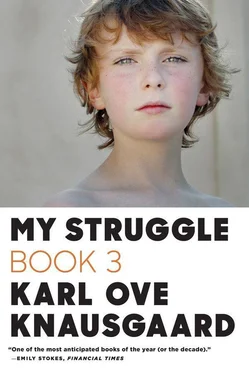Down to the floor, off with my boots — which I carried through the hall and put on again on the porch — open the door and out again. Hollow with fear and tension, I looked down the hill. No cars, nothing. As long as he stayed away for the next two minutes, and didn’t come home because he had forgotten something, or because he was ill, which never happened, Dad was never ill, everything would be fine.
A little gasp of joy escaped my lips. I hurried over to the garbage can, carried it to its place, put the garbage bag back in, folded it over the edge, and dashed back to the window. To my horror, I saw that the container had left marks in the grass. Quite deep marks, too. I ran my hand over the grass and tried to ruffle it to cover the patches where the edge had sunk in and formed a ridge in the muddy soil. Straightened up and regarded my handiwork.
You could still see it.
But if you had no idea it was there, perhaps it was more difficult to see?
Dad saw everything. He would see it.
I crouched down and ruffled the grass some more.
There.
That would have to do.
If he saw it I could always deny all knowledge. I doubted he would be able to imagine I had carried the garbage can onto the lawn and put it under the window to climb in. No, if he saw the mark it would be a mystery to him, utterly unfathomable, and so long as I denied all knowledge in a normal voice and with a normal expression he would have nothing else to go on.
I wiped my moist, dirty hands on my thighs and went up to my room with my satchel. Opened the wardrobe door and was about to put on my white shirt, warmed by the happy thought that Anne Lisbet would think it looked good, when I came to my senses and dropped the idea, in case Dad asked why I had changed clothes and I got myself into a tangle that he would be able to unravel.
Then I locked the front door, climbed up onto the hot water tank, turned around, stuck my feet through the window, gently lowered myself until I let go, and landed on the ground with a bump.
Picked myself up, down to the drive as fast as possible, acting as if nothing had happened.
There were no cars to be seen now. John Beck, Geir Håkon, Kent Arne, and Øyvind Sundt were standing at the crossroads. When they saw me they cycled over. I stood still, waiting for them.
“Have you heard?” Geir Håkon said, braking just in front of me.
“Heard what?”
“A workman on Vindholmen was cut in two by a steel cable early today.”
“Cut in two?”
“Yes,” John Beck said. “The wire snapped while towing. One end hit a man and cut him in two. Dad told me. Everyone was given the day off.”
I imagined a man on a tug being cut in two, the top half, the past with the head and arms, standing beside the bottom half, the part with the legs.
“You still have a puncture?” Kent Arne said.
I nodded.
“You can sit on the back of mine.”
“I’m off to see Geir,” I said. “Where are you going?”
Geir Håkon shrugged.
“Down to the boats maybe?”
“Where are you two going?” Kent Arne said.
“To see someone in the class about homework,” I said.
“Who, if I might ask?” Geir Håkon said.
“Vemund,” I said.
“Do you two hang out with him?”
“Nope,” I said. “Just today. I’ve got to get going.”
I ran up the hill and shouted for Geir, who came out right away with a slice of bread in his hand.
Twenty minutes later we walked past B-Max again, along a flat stretch that, after a bend, ascended to the highest point on the estate where the road began that led to where Anne Lisbet, Solveig, and Vemund lived. It was also possible to get to it by walking in the opposite direction from our house because the road that linked all the side roads and housing areas on the estate went in a circle, inside which was our own circular Ringvei. As if that wasn’t enough, the main road outside also went in a circle, around the whole island. So we lived inside a circle inside a circle inside a circle. A hundred meters past the supermarket the two outermost roads ran parallel, but you couldn’t see that because they were separated by a rock face, perhaps ten meters high, molded into a brick wall. Above this wall was a green wire fence, beyond that there was a rocky slope, and then came the road we were following. But even though we couldn’t see the cars whizzing past beneath us we could hear them. The sound of the cars was exciting, and we climbed down to the fence. At first we heard them as a faint drone as they came up the hill from the Fina station, then the volume rose and rose until they were racing past beneath us, the roar of their engines amplified by the rock face. We decided we would throw stones at them. As we couldn’t see the cars, the trick was to time the sounds exactly. We each took a stone in our hands and waited for the next car. The stones were big, bigger than our hands, but not so heavy that we couldn’t heave them over the fence, from where they fell vertically, ten meters down to the carriageway. Geir started. He threw as the car was beneath us, and missed, of course, we heard the faint, hollow clunk as it landed on the tarmac and rolled downward. When it was my turn, however, I threw much too soon; when the stone hit the road the car was probably fifty meters away.
A woman walked along the sidewalk carrying a bag in each hand. She stopped and spoke to us, even though we had never seen her before.
“What are you doing down there?” she said.
“Nothing much,” Geir said.
“Come on up,” she said. “It’s steep and dangerous there.”
She set off walking again, but kept an eye on us, so we did as she said and went up.
We balanced on the curb all the way up to Vemund’s house. Outside, his sister was on her knees playing in a sandpit. Her waterproof jacket and bottoms were yellow, the bucket blue, and the spade green.
“Want to go and see Vemund first?” Geir said.
“No, let’s not,” I said. “Let’s start with Anne Lisbet.”
The sound of her name was electric, thousands of crackling nerve channels opened inside me as I articulated the words in my mouth.
“What is it?” Geir said.
“What’s what?” I said.
“You went a bit funny.”
“Funny? No. I’m quite normal.”
After a few steps up the road, covered on one side by a film of water running downward, so thin that it quivered rather than ran, we could see the gable end of the house where Anne Lisbet lived. It was situated at the top of a hill, with a lawn at the front, trees below. A window on the top floor, there was a light on, was that her room perhaps? On the other side of the road was Myrvang’s house and the house where Solveig lived, below them the forest, green and dark and wet. We passed them, and the road ended in a gravel cul-de-sac on the edge of the forest. From there a drive led to Anne Lisbet’s house. A light shone above the front door.
“Will you ring?” I said when we were there.
Geir stretched up on his toes and pressed the doorbell. My heart was fluttering. A few seconds passed. Then her mother opened the door.
“Is Anne Lisbet in?” I said.
“Yes,” she said.
“We’re from her class,” Geir said. “We’ve brought her homework.”
“How nice of you,” she said. “Would you like to come in?”
She had blonde hair and blue eyes, so completely different from Anne Lisbet, but she was good to look at as well.
“Anne Lisbet!” she called. “You’ve got visitors from your class!”
“Coming!” Anne Lisbet called from above.
“Isn’t she ill?” I said.
Her mother shook her head.
“Not anymore. We were just keeping her here for another day to be on the safe side.”
“Oh, yes,” I said. Footsteps sounded on the stairs, and Anne Lisbet appeared. She was holding a slice of bread in one hand and smiling at us with her mouth full.
Читать дальше












